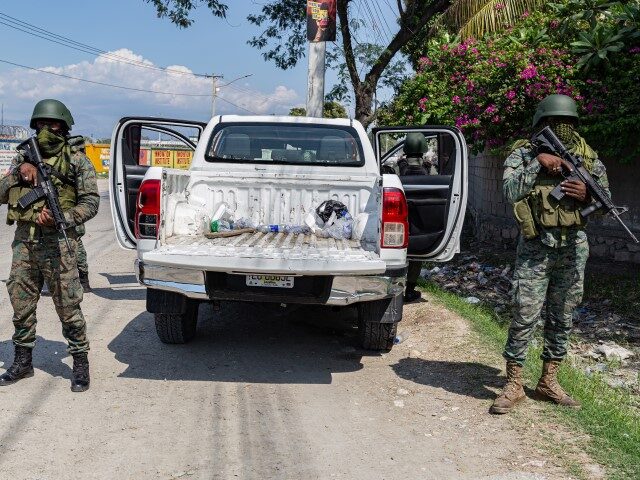Kenyan opposition leader Ekuru Aukot on Wednesday announced he will file a court challenge against President William Ruto’s plan to send hundreds of Kenyan police officers to Haiti.
“We still intend to challenge this in court. We are just waiting for the government to make its next move,” Aukot said.
The opposition leader added that if Ruto attempts to deploy forces to Haiti without legal approval, he will ask for a contempt of court finding against the president.
The United Nations has been pleading for a multinational intervention in Haiti since President Jovenel Moise was assassinated in July 2021, unleashing a tidal wave of chaos and gang violence.
No hemispheric power was eager to step into the Haitian quagmire, including the United States and Canada, which usually have leadership roles in such peacekeeping missions. Keyna eventually offered to send a thousand police officers to lead the multinational force in the summer of 2023, an offer the U.N. Security Council (UNSC) officially accepted in October.
However, the Kenyan high court ruled in January 2024 that Ruto and his National Security Council lacked the constitutional authority to deploy regular police forces outside the country.
That ruling came in response to an action brought by Aukot, who insisted Ruto’s plan for a Haitian mission was illegal. The Ruto government said it would appeal the high court ruling, a move applauded by the United Nations.
On March 1 Ruto signed a renewed agreement with Haitian Prime Minister Ariel Henry to send Kenyan police into Haiti. Aukot promptly returned to the court with a fresh request for an injunction.
Many Kenyans are skeptical of the intervention plan, noting that previous Haitian peacekeeping missions have not fared well and there is reason to believe much of the Haitian public would resent any international force as an effort to keep the questionably legitimate Henry in power.
“Solutions for Haiti, including those to bolster the Haitian National Police and the army to tamp down violence and return some semblance of security, should be led by Haitians,” Mercy Corps Country Director for Haiti Laurent Uwumuremyi said in support of the high court’s decision in January.
At least one influential Haitian opposed the Kenyan intervention plan on similar grounds: former rebel leader Guy Philippe. Philippe warned that Haitians might come to see their Kenyan “brothers” as “enemies” for propping up Henry’s rule.
“We have a government here in Haiti that has no legitimacy, no one loves them. This government is helping gangs, killing innocent people, kidnapping and serving the interest of imperialism,” he said.
Aukot is on the same wavelength as Philippe, calling out Henry as an “imposter” and “persona non grata” in a Thursday social media post.
“[Henry] has not been allowed back home by the militias in Haiti. The USA has recalled its citizens from Haiti. Canada has closed its embassy in Haiti and recalled its citizens. The violence in Haiti is worsening,” he said.
Henry disappeared from public view after signing the agreement with Ruto in Kenya on Friday, resurfacing in Puerto Rico on Tuesday after an unsuccessful attempt to arrange a stealthy return to Port-au-Prince. Haiti was convulsed with the worst gang violence to date after Henry left the country, with gang leaders vowing to topple his government and terrorize him out of returning to the country.
“Only Kenya is ready to send its policemen to Haiti. No one knows what Kenya is getting out of this move, and no one knows how it was negotiated. What does the agreement entail? This is truly puzzling,” Aukot said.
The Kenyan opposition leader is, to put it mildly, no fan of Prime Minister Henry.
“Poor Ariel Henry. He willingly accepted to be used. Now he has been abandoned after signing a bogus agreement in Kenya. He can’t even go to a country he claims to be the leader of,” he sneered after Henry went missing over the weekend.
The Biden administration is reportedly leaning on Henry to resign instead of returning to Haiti, to be replaced by a transitional government until new elections can be held. United States officials said on Thursday they fear the Haitian government could “fall at any time” as the gangs continue their bloody rampage and police morale crumbles.
“If the HNP [Haitian National Police] dissolves as an effective counterforce, if we see the airport or the presidential palace fall, it’s over,” one American official said.
The Biden administration still refuses to put American boots on the ground and it now seems skeptical about Kenya’s thousand police officers being able to make a difference, even if the legal challenges against their deployment are overcome.
“Whenever the MSS [Multinational Security Support mission] does arrive, it remains unclear how Kenyan forces and leadership – who speak English and Swahili – will operate with a French and Creole-language Haitian force. And it has yet to be determined whether the Kenyan-led forces will take static positions at key sites, freeing Haitian police forces to battle gang members elsewhere, or if the Kenyans would fight alongside their Haitian partners,” the Miami Herald noted on Thursday.
The Miami Herald further noted that Kenya is supposed to provide the vanguard of a multinational force that will be over 2,500 strong in total, with at least five unnamed countries committed to providing personnel – but these forces would not all be arriving in Haiti at the same time, so the gangs might be able to destroy them piecemeal as they turn up at ports and airfields.
“How much time do we have to do this? This was urgent two years ago. It’s incredibly urgent now. The situation in Haiti is as critical a humanitarian and security crisis as we’re facing around the world,” an exasperated Biden administration official said.

COMMENTS
Please let us know if you're having issues with commenting.